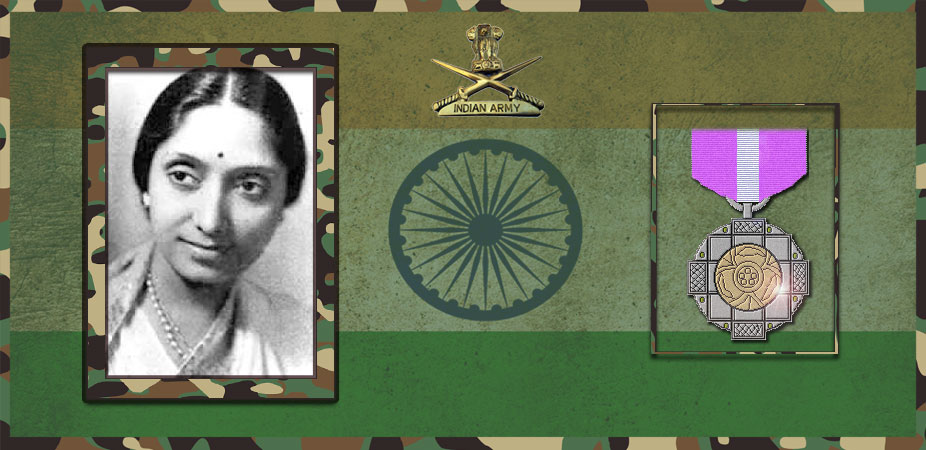Let's salute to our Indian Army together, We are proud to be Indian.
Let's salute to our Indian Army together, We are proud to be Indian.

Hirabai Barodekar (1905 – 1989) was an Indian Hindustani classical music singer, of Kirana gharana. She was disciple of Ustad Abdul Wahid Khan.
Hirabai was born as Champakali to Kirana Gharana master Ustad Abdul Karim Khan and Tarabai Mane. Tarabai was the daughter of Sardar Maruti Rao Mane, a brother of princely Baroda state’s “Rajmata” during the middle of the 19th century. Abdul Karim Khan was the court musician in Baroda when Tarabai was young, and he taught her music. The two fell in love and decided to get married; but Tarabai’s parents disapproved of the alliance, and the couple had to leave the state (along with Abdul Karim’s brother, Ustad Abdul Haq Khan). The couple moved to Bombay (Mumbai), and had two sons: Suresh or Abdul Rehman, and Krishna and three daughters: Champakali, Gulab, and Sakina or Chhotutai. In their adult lives, the five respectively became known as Sureshbabu Mane, Krishnarao Mane, Hirabai Badodekar, Kamalabai Badodekar, and Sarswatibai Rane.
She had her initial training from her brother Sureshbabu Mane and later training from the doyen of Kirana Gharana, Ustad Abdul Wahid Khan, who was a cousin of her father, Ustad Abdul Karim Khan. (In 1922, Hirabai’s parents had parted company thus Hirabai received only limited musical lessons from her father.)
She often performed along with her younger sister, Saraswati Rane
Hirabai appeared in her first public performance under patronage of Kesarbai Kerkar at the age of 15.
She was an expert in Khyal, Thumri, Marathi Natya Sangeet, and Bhajan. She is credited with having popularised Hindustani Classical Music among the masses. She was truly pioneer of concerts by women artists in India. She the real pioneer and was the first female artist who introduced ticketed concerts in India. She was always amazingly popular on stages and her shows were jam-packed. A very fragile, honey voice, emotive factor, peaceful and exorbitant vocal clarity are her strengths. She was admired by the real class and those were mass. Her amazing rendition of ‘Taar Sa’ was very popular and became her hallmark. She made Kirana gharana more popular and rich.
Hirabai acted in several movies, including “Suvarna Mandir”, “Pratibha”, “Janabai”, and “Municipality”. She also started a music school, “Nutan Sangeet Vidyalaya”, to teach music to girls. The school staged several plays.
Hirabai became a recording artist very early in her career. (Her 78 rpm recordings have been re-released on cassettes by RPG in their Classical Gold series). She was titled as “Gaanhira” (a singing diamond). Her nature was so down to earth and peaceful which was truly ideal.
Hirabai’s work in Hindustani music fetched her many prestigious accolades. She was awarded with the Sangeet Natak Akademi Award in 1965 and the Padma Bhushan Award in 1970. She was also awarded Vishnudas Bhave Award for her contribution to theater.
She was chosen to sing the national anthem, Vande Mataram, from the Red Fort in India’s capital Delhi on the day India received its independence from the British Raj (15 August 1947). She visited China and the East African countries as a part of an Indian Delegation in 1953.
She was titled “Gaan kokila” (nightingale of India) by Sarojini Naidu. An annual music festival is held in Mumbai by her disciple Dr Prabha Atre by the name ‘Sureshbabu – Hirabai Smruti Sangeet Samaroh’ since 1992, which becomes one of the major festival of music in the country .
She was married to Shri. Manikrao Gandhi- Barodekar. She passed through various troubles in her life especially to family requirements and the dependents to her were huge.Despite being such a talented and a blessed soul she was more ill treated and tactfully handled by people around to get her down. But she was so peaceful and truly ideal by herself.